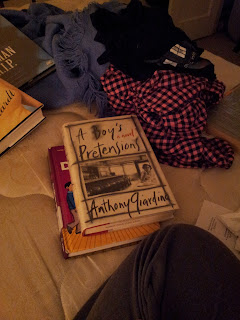Books: Bitter is the New Black: Confessions of a
Condescending, Egomaniacal, Self-Centered Smart-Ass, or Why You Should Never
Carry a Prada Bag to the Unemployment Office
Bright Lights, Big Ass: A Self-Indulgent, Surly Ex-Sorority
Girl’s Guide to Why It Often Sucks in the City, or Who Are These Idiots and Why
Do They All Live Next Door to Me?
Author: Jen Lancaster
Published: 2006 (New American Library), 2007 (New American
Library)
Pages: 398, 380
Comfort reading again, my friends! You know I’ve read Lancaster’s
take on dieting, right, and maybe the other book of hers that my library has
but I can’t remember, which doesn’t really tell you about her quality of
writing because it’s truly very fun, so much so that I picked up this early
duet of hers on volunteer credit for some rough week or another that I had to
think too much at my job and just wanted my lunch breaks/apartment hermit time
to be spent in the company of a lady who is much more amusing than I had the
energy to be.
I wanted to get to her origins, superficially to see what
her writing was like before she had any chance of slipping in annoyingly
annoyed reference to her own writing (look, we all think and procrastinate in
the exact same way, but SOME OF US DON’T HAVE A BOOK DEAL TO APPLY TO IT) and a
little more profoundly what she got famous for in the first place.
It worked on both accounts, at least in Bitter is the New
Black. She used to be an excellent, hard-working hard-spending hard-partying
salesperson until she got fired for no good reason. She took it exactly like a
type-A perfectionist with a brand-name habit seems like she would – badly – and
she mines almost four hundred pages of wicked (read = extremely bitchy if you
are on the other end of it, pretty close to hilarious if you could just sit
back and watch, or read) humor out of how her lifestyle crashes straight into
her sudden lack of income.
Yes, she is mostly self-aware of how entitled she sounds
through it all – but only mostly. Even as I know she’s satirizing herself, it
really is hard to feel sorry for someone who has nothing after being laid off
from such a lucrative job solely because of luxuries that were all completely
unnecessary and 100% her choice.
Bright Lights, Big Ass mostly avoids that, being a
collection of essays she wrote after finally learning how to pare down her
lifestyle and getting all that in check so she has more time to discover what
unique indignities city life offers even the most regular people (which she is
proud to say she still is not), like superconfusing public transportation
(where does the Purple Line even go?! This woman was trying to get to a
library!) and levels of snobbery in dog parks.
However – BLBA has that
oh-ugh-I-have-to-write-because-I-told-someone-I-would-for-money tinge to a
couple essays, and as a writer who has a short story and three poems getting
published between now and January and won’t see a free lunch out of any of them
and is still gobsmacked with joy at her babies growing up and saving China –
well, it’s just annoying. Plus the essays lack a central goal for her to work
towards, which isn’t a bad thing but is more aimless than when she’s stubbornly
staring down a challenge, powering her way through it, or finding inventive,
sometimes hilarious and always ultimately expensive ways of getting out of it.
Bookshelf, I think. I will probably end up rereading them
during future times of stress, if only to learn how to complain like a
champ.










